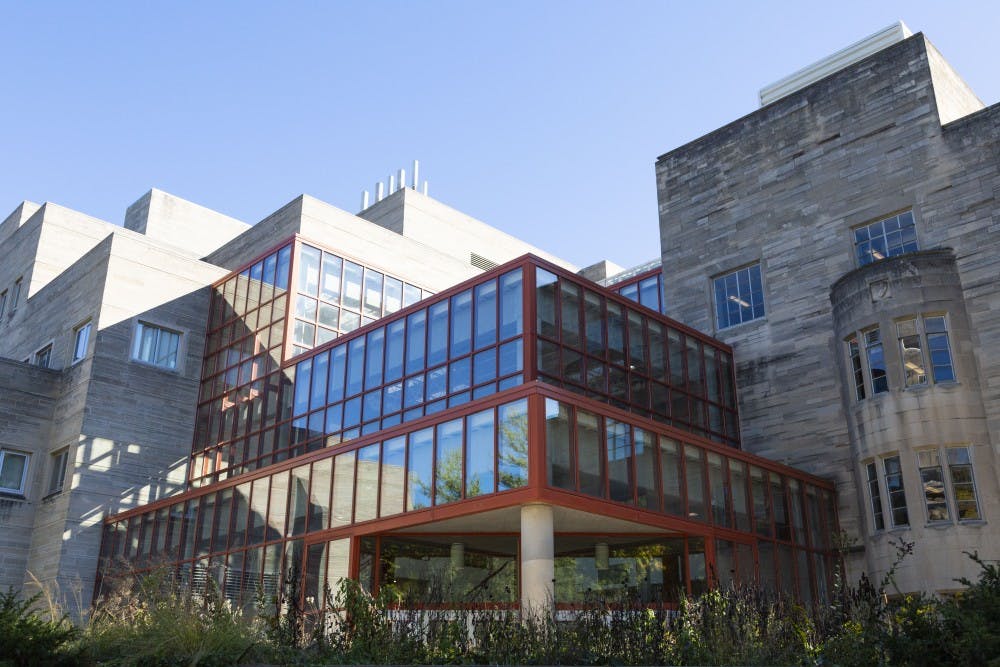In light of the renaming of what was known as the Wildermuth Intramural Center earlier this month, students and faculty discussed renaming Jordan Hall on Friday afternoon at the Political and Civic Engagement program’s Free Speech Friday.
Debate centered around the importance of the issue.
David Starr Jordan, the namesake of the building, was a ichthyologist, a professor, the seventh president at IU and the founding president of Stanford University. But he also subscribed to eugenics, the belief and practice of improving the human population through select breeding of "desirable" genetic traits.
Jordon wrote a series of publications titled "The Blood of the Nation: A Study in the Decay of Races by the Survival of the Unfit", which presented ideas about selective breeding and was aimed at bringing eugenics to the non-academic audience. Jordan wrote that people with low IQ scores, mental illness or any disability must be sterilized to improve the human species.
In November of 2017, anonymous flyers were placed around Jordan hall with facts on them about Jordan’s contributions to eugenics. This began the movement to rename the hall.
“A lot of people might not know the word ‘eugenics’ today at all but actually have absorbed a lot of the attitude that was promoted by not just David Starr Jordan, but tons of people a hundred years ago who had this idea that they were the best people, they were the elite and they were the ones whose type should be expanded,” associate professor Carl Weinberg said.
Weinberg is a professor in the PACE program.
Weinberg said American eugenics were the main inspiration for the Nazi’s “Final Solution.” Many famous Progressives, however, supported eugenics including W. E. B. DuBois, a black civil rights activist in the early 1900’s. Weinberg said eugenics was sometimes based more on classism than racism.
Junior Moira Kehoe spoke to the University’s decision to change the name of Wildermuth Intramural Center and the connection to the issue of Jordan Hall.
“I think you can’t justify not renaming it because you’re renaming the Wildermuth center,” Kehoe said. “Once you’ve done that, you’re kind of prioritizing what you consider to be acceptable and unacceptable.”
Senior Parker Zent argued against the importance of changing a building’s name.
“I think that we tend to get only worked up about the things that are easy for us to get worked up about," Zent. "I can think of about 80 more important issues than this.” .
To Zent, issues like poverty, homelessness, addiction, mental health, suicide and sexual assault should be the issues people are focusing on. Not the renaming of buildings.
To others, serious social issues and the renaming of Jordan Hall are intertwined.
“I think it’s time to get riled up about these things and while it may seems small, the name of a building, it’s like ‘Who cares, it’s the name of the building," it stands for something so much bigger,” junior Julia Weinstock said. “By standing up and saying, ‘No, this isn’t OK,' you’re standing up to the hate that has been normalized in this country now.”
Senior Jazzmine Navarre spoke about the importance of not staying silent, especially about racial issues.
“I think one of the biggest problems in America is people being quiet,” Navarre said. “That’s when bad things happen in American history. When no one tells you that you’re doing anything wrong, you can see that people will do whatever they want. They can enslave millions of people for 200 years because no one said it was wrong.”
In March 2018, a middle school in Palo Alto, California named after Jordan changed its name from Jordan Middle School to Greene Middle School due to Jordan’s commitment to eugenics. Frank Greene Jr., the namesake of the renamed school, was a black leader in the tech industry who supported female and minority startups.
Jordan was one of the founders of the Human Betterment Foundation which promoted sterilization programs in the United States that sterilized the genetically "unfit." This especially included the inmates at state mental health facilities. He was a member of the foundation and supporter of eugenics until his death in 1931.
Indiana was the first state to enact compulsory sterilization legislation in 1907. It required physically and mentally disabled and ill people to be sterilized, which leaves a person unable to reproduce. According to the Indiana State Government website, there were approximately 2,500 sterilizations in Indiana during the time the bill was in place.
Kehoe and Weinstock both spoke about making the learning environment of Jordan Hall more comfortable for everyone. Weinstock emphasized that renaming the building is especially important because it is a place where students are forced to be for classes.
“I would rather have someone who has done something recently that has had such an impact to IU, that upholds the values they have today, rather than the values they had back then,” Kehoe said.




